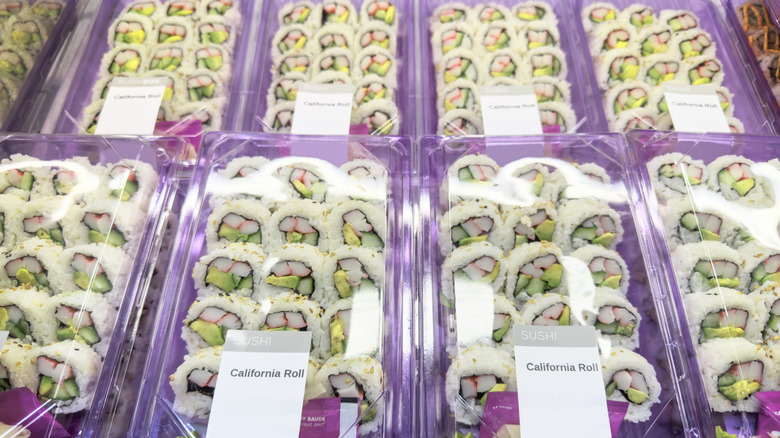Is Grocery Store Sushi Safe To Eat?
No matter how good they may taste, some foods just have some branding barriers to overcome. The prime example would surely have to be grocery store sushi, which struggles to overcome its bad reputation as a less fresh, subpar version of the handmade rolls you'd enjoy at a restaurant. While this unsavory reputation is not without some merit — after all, grocery store sushi tastes different from restaurant sushi — don't let the idea of snagging a California roll where you do your weekly supply haul give you the ick.
Grocery store and restaurant sushi are, generally speaking, no different in terms of food safety. As long as ingredients have been properly handled and stored and the finished product is consumed by its best-by date, it's generally safe to eat. And no one has to tell Americans twice — with its citizenry enjoying convenient prepared sushi by the millions. Notably, the grocery giant Kroger has officially snagged the spot of America's largest seller of sushi, churning out 40 million pieces of prepackaged sushi each year.
Each retailer that sells sushi — from Walmart to Sprouts to Whole Foods — has its own system of suppliers that bring in ingredients or premade rolls. Ask a store employee if you have questions about the origins, use a discerning eye to look for best-by dates, and as with all sushi, keep an eye out for unpleasant smells, slimy textures, or dull or off colors, all clear indications of decay.
While generally safe, consuming sushi is not without caveats
Whether from a restaurant or retailer, sushi can be a healthy choice — loaded with wholesome ingredients like veggies, rice, and fish. That said, consumption of any fish is not without risk. In addition to the same potential for foodborne illness as any other edible, there's also the worryingly high levels of mercury found in many species. While a typical sushi habit is perfectly safe, experts agree that excessive consumption of any affected fish can lead to mercury poisoning, which causes symptoms ranging from damage to the nervous system, issues with memory, and organ failure. Those extra susceptible, like children or pregnant people, may want to steer clear entirely. However, the chances of mercury poisoning from tuna or other sushi are pretty low if you consume a reasonable amount.
If prepackaged fish gives you the heebie-jeebies altogether, you can still enjoy the briny seaweed flavors of sushi, sans seafood — another way to avoid potential mercury concerns. Many grocery stores offer plant-based veggie sushi. Look for an avocado cucumber roll, for example. High-end stores like Whole Foods even have fresh sushi counters where you can request vegan rolls and get expert sushi-eating tips from their chefs.
Ultimately, sushi preference is a deeply personal matter. With the green light to safely revel in your grocery store sushi habit — as long as you observe common sense food safety rules — the only thing left to do is conduct your own taste test. So snap open those chopsticks, grab your tamari, and test out which retailer's rolls are about to be your go-to affordable indulgence.

